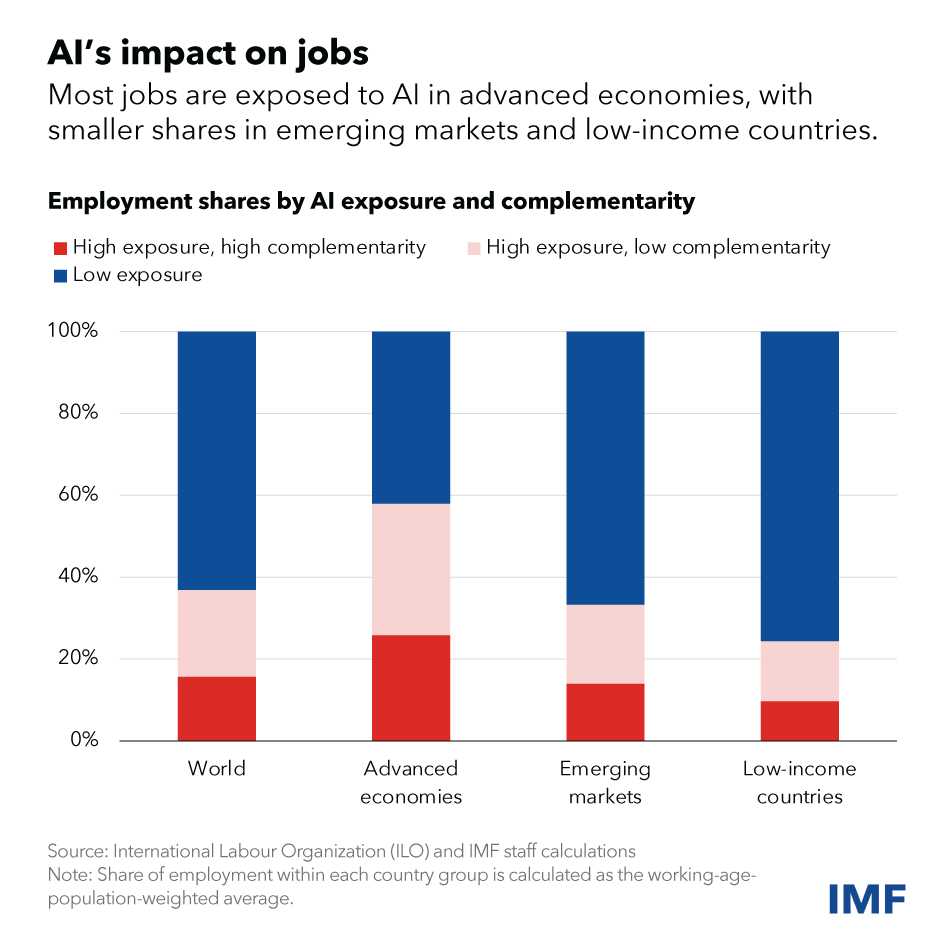In line with IMF’s managing director, Kristalina Georgieva, AI expertise is poised to affect practically 40% of jobs worldwide, presenting alternatives and challenges.
Georgieva stresses, “In most situations, AI will doubtless worsen general inequality,” underscoring the necessity for strategic coverage interventions to harness AI’s advantages whereas mitigating its dangers.
The IMF’s evaluation additional revealed a stark variation in AI’s affect throughout completely different economies.
In superior economies, roughly 60% of jobs could possibly be influenced by AI, with half probably benefiting from enhanced productiveness because of AI integration.
Nonetheless, there’s a flip facet: AI might displace human abilities, diminish labor demand, affect wages, and, in excessive circumstances, eradicate jobs totally.
The projected affect is 40% and 26% in rising markets and low-income nations, respectively.
The analysis additional reveals a considerable threat of AI exacerbating revenue and wealth inequality each inside and between nations. Excessive-income and youthful employees would possibly profit extra, whereas low-income and older employees could possibly be deprived.
Georgieva factors out, “Many of those nations don’t have the infrastructure or expert workforces to harness the advantages of AI,” highlighting a rising threat of expertise inequality.

The IMF additionally indicated that employees adept at using AI might see elevated productiveness and wages, whereas others would possibly fall behind.
This feeds into the ‘adapt or die’ narrative of AI adoption for each people and firms.
“Adapt or die.”
Inform me, how does one ‘adapt’ to this.
Individuals who suppose AI goes to be an infinite cash printing machine for everybody by no means took an economics class or discovered what inflation is. You’re being offered a lie. pic.twitter.com/ZmQCbegZGF
— Reid Southen (@Rahll) January 14, 2024
Analysis in 2023 indicated how far AI labor disruption would possibly lengthen, however 2024 up to now has seen a few of these forecasts come into actuality. Current controversies involving corporations changing artists with AI and layoffs at Duolingo point out this rising pattern.
Final 12 months, tech bosses like OpenAI CEO Sam Altman and Nvidia CEO Jensen Huang urged younger folks to take a position time in studying AI.
Recognizing the challenges, Georgieva emphasizes the significance of complete social security nets and retraining applications, asserting, “It’s essential for nations to determine complete social security nets and provide retraining programmes for weak employees.”
The AI Preparedness Index
In response to its analysis, the IMF developed the AI Preparedness Index to help nations in getting ready for AI’s affect.
This instrument evaluates readiness throughout domains like digital infrastructure, labor market insurance policies, innovation, and regulatory frameworks.
The index reveals that wealthier nations, together with superior and a few rising economies, are typically extra ready for AI adoption.
The worldwide response to AI’s rise consists of steps towards regulation. As an example, the European Union (EU) is transferring in the direction of implementing the world’s first complete AI legal guidelines, with the European Parliament set to vote on these proposals.
The IMF’s analysis comes forward of the World Financial Discussion board (WEF) in Davos, Switzerland. The WEF not too long ago printed that 79% of high economists predict that generative AI will considerably improve manufacturing effectivity in high-income areas this 12 months, whereas 74% foresee a lift in innovation.
94% of economists count on these productiveness enhancements to have a substantial financial affect on high-income economies over the subsequent 5 years. In distinction, solely 53% imagine low-income economies will expertise related good points.
Relating to employment, the outlook is much less favorable. About 73% of economists don’t count on AI to positively affect employment in low-income economies. Practically half (47%) categorical related reservations for high-income economies.
In conclusion, as Georgieva aptly places it, “The AI period is upon us, and it’s nonetheless inside our energy to make sure it brings prosperity for all.”
The proof underlying this assertion paints a nuanced image the place productiveness and disruption are finely balanced.


